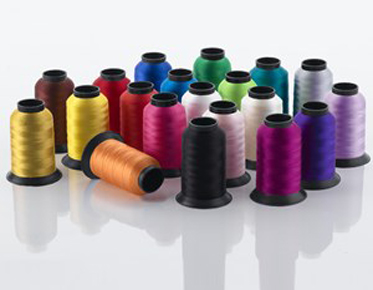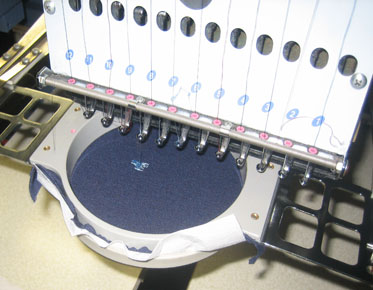Why Is My Embroidery Thread Looping on Top of Fabric: Causes and Solutions
Embroidery enthusiasts often encounter the
frustrating issue of thread looping on the top side of their fabric. In this
article, we will explore the various causes behind this problem and provide
effective solutions to prevent it. Additionally, we will introduce the benefits
of Eagle Digitizing's digitizing services in enhancing embroidery projects.
I. Improper Threading and Tensioning
l Incorrect threading of the machine can
lead to looping stitches. Ensure both the top and bobbin threads are correctly
threaded, paying attention to the positioning between the tension discs.
l Improper tension settings,
specifically loose needle tension, can contribute to thread looping. Adjust the tension settings to achieve the right
balance.
II. Needle-Related Issues
l A damaged, dull, or wrong needle can cause thread looping. Inspect the needle for any signs of damage or dullness and replace it if necessary. Use the appropriate needle size and type for your fabric and thread.
III. Thread Type and Quality
l Using low-quality or unsuitable
threads can result in looping stitches. Choose high-quality threads
specifically designed for machine embroidery to minimize the occurrence of loops.
l Specialty threads, such as metallics,
may have a higher tendency to loop. Adjust the stitch length and density to
accommodate these threads.
IV. Fabric and Hooping Considerations
l Hoop or fabric bouncing, also known as
flagging, can lead to looping stitches. Ensure the fabric is properly hooped
and secure to minimize movement during embroidery.
l Dense designs on lightweight or
delicate fabrics may cause looping. Avoid using designs that are too dense for
the fabric being embroidered.
V. Solutions to Prevent Looping Stitches
l Rethread your machine, both top and
bottom, with the presser foot up to ensure proper thread seating between the
tension discs.
l Adjust the tension settings to achieve
the right amount of tension on the needle thread.
l Use the smallest sharpest needle that
can carry the thread through the fabric without causing damage.
l Select high-quality threads designed
for machine embroidery, avoiding specialty threads that are more prone to
looping.
l Properly hoop the fabric, securing it to minimize any bouncing or flagging during embroidery.
VI. Enhancing Embroidery with Eagle Digitizing's Services
l Eagle Digitizing offers professional digitizing services for
embroidery designs, optimizing them to reduce the chances of looping stitches.
l Their experienced digitizers ensure
accurate stitch counts and density adjustments for different fabric types,
contributing to superior embroidery results.
l Seamlessly integrating with your
embroidery workflow, Eagle Digitizing's embroidery digitizing services streamline the production process, enhancing the
overall quality of your embroidery projects.
FAQs:
Q1: How can I prevent looping stitches when using metallic threads?
A1: Metallic threads have a higher tendency to
loop. Adjust the stitch length and density to accommodate these threads.
Additionally, ensure the machine is properly threaded and tensioned.
Q2: Can the wrong needle size cause looping stitches?
A2: Yes, using the wrong needle size for your fabric and thread can contribute to looping stitches. Use the smallest sharpest needle that can carry the thread without causing damage.
Q3: How often should I have my embroidery machine cleaned?
A3: It is recommended to clean your embroidery machine after every project or whenever you notice lint and debris buildup.
In conclusion, Understanding the causes behind
embroidery thread looping on top of fabric is crucial for resolving this
frustrating issue. By addressing improper threading and tensioning,
needle-related problems, thread type and quality, and fabric and hooping
considerations, you can prevent looping stitches and achieve better embroidery
results. Eagle Digitizing's professional custom digitizing services provide a valuable solution to enhance the quality of
your embroidery projects. By leveraging their expertise, advanced technology,
and tailored approach, you can minimize the occurrence of looping stitches and
achieve exceptional embroidery results. Partnering with Eagle Digitizing
empowers you to focus on your creativity and enjoy flawless embroidery
outcomes. Elevate your embroidery projects with their expertise and digitizing
services for a seamless and loop-free experience.



